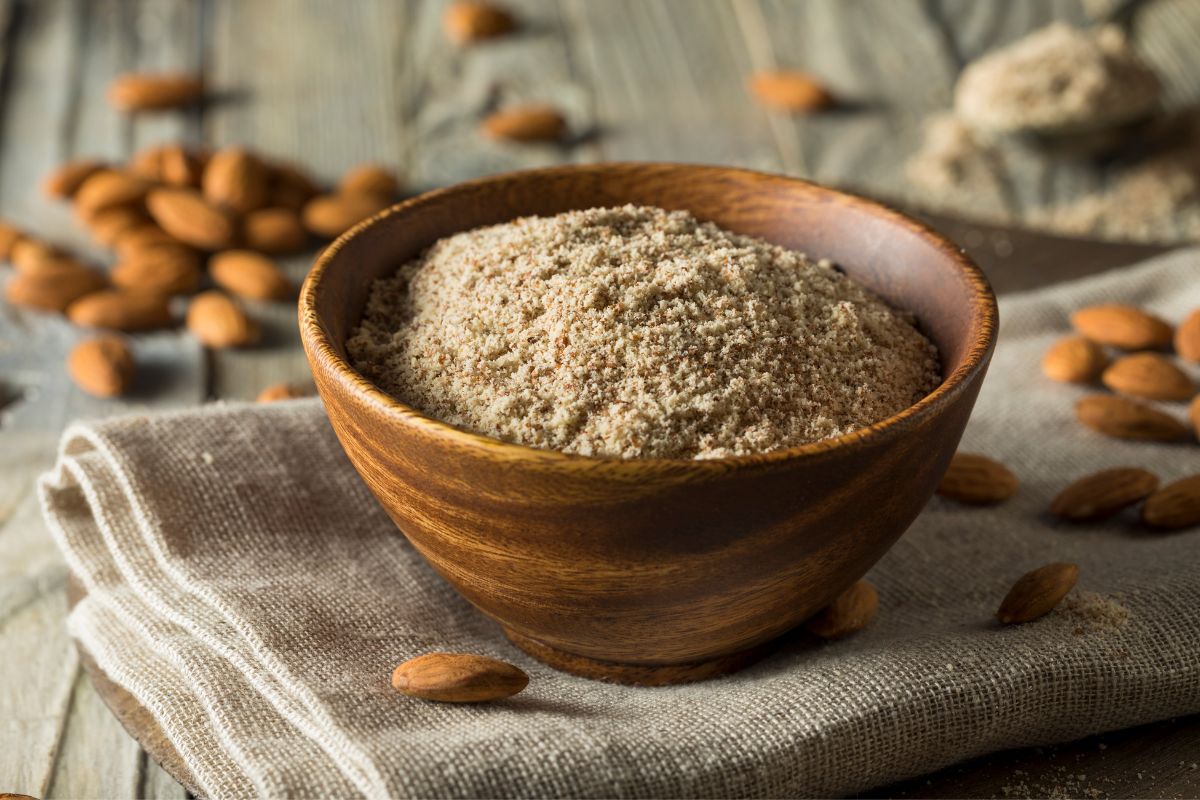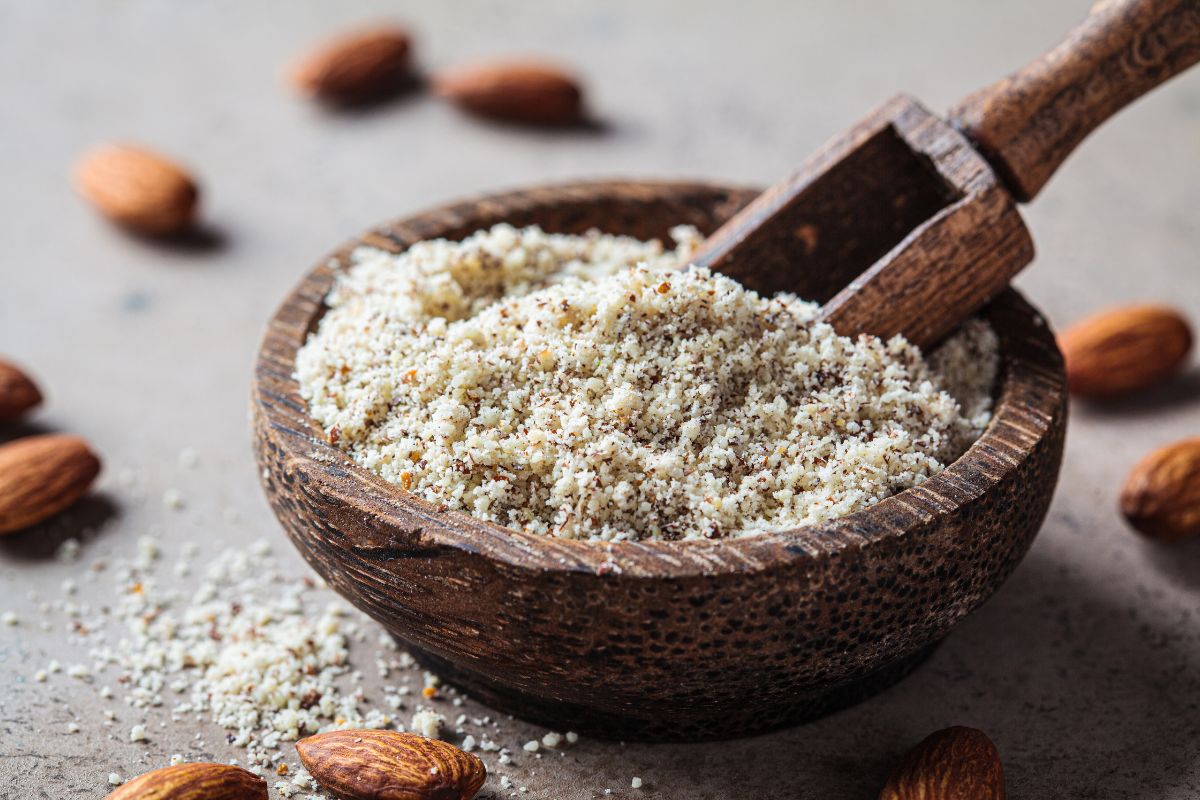Almond flour, like many other almond products, has recently grown in popularity globally.
This ingredient is versatile and easy to use, making it an all-round winner! However, there are still questions about how long almond flour lasts, and if it goes bad at all.

Since food safety is something that we take very seriously here, this is something that needs to be discussed! Here, we will go through everything you need to know about almond flour safety – from how long it lasts and expiry, to proper storage.
If that sounds like something you need to learn about, stick around!
Does Almond Flour Ever Expire Or Go Bad?
Almond flour absolutely does go bad and expire. It does not last as long as flours like self-raising or all-purpose flour due to the fact that it is made of almonds.
Almonds have a high-fat content, which means that the flour can turn rancid much faster than you might expect. This is especially the case when it is stored incorrectly.
Because of this, many brands actually recommend refrigerating or even freezing almond flour. This will work wonders to increase the longevity of the ingredient so that you can get more use out of it.
Another recently popular flour product that does is coconut flour – so be on the lookout for that, too!
How Long Will Almond Flour Usually Last?
The “best by” labels differ greatly depending on how you store your almond flour.
When kept in the pantry, an unopened pack of almond flour can last between 1–2 months, and in the refrigerator anywhere between 6–12 months! Similarly, an open packet in the pantry should only be used up to its “best by” date, but in the fridge, it can last between 3–6 months.
Unopened
Unopened almond flour will last longer than opened almond flour. This is the case with all food products!
However, you should be aware of the differences in how long unopened almond flour can be stored based on the environment it is in.
If you have an unopened package, and you choose to keep it in the pantry, you should only expect it to last between 1–2 months. In some cases, this could be even shorter, but also longer.
In the fridge, your unopened almond flour can last up to a year, or maybe even more. This is a significant increase in shelf life, so it might be worth taking measures to preserve your almond flour!
After Opening
Once you open your almond flour, its longevity will be cut in half. If you choose to store your open almond flour in the pantry, you should aim to use it before the “best by” date to ensure that it is still safe.
You may be able to stretch it for a short time after that, but always exercise caution, and look out for any signs of spoilage.
If you decide to store your opened almond flour in the fridge, however, you can

How Can You Tell If Almond Flour Has Gone Bad?
You will know if almond flour has gone bad if you notice a sour, bitter, or general “off” smell coming from the product. When this flour goes rancid, you usually know about it, especially if you rarely use it and open the container or bag to get smacked in the face by an unpleasant odor.
However, there are other ways to tell if almond flour has gone bad without opening and smelling it! You can take into account the appearance of the product.
Fresh, quality almond flour should be a beige or creamy color. When it goes off, though, this color will darken. The darkness of the color may depend on how far gone the flour is, so this can vary!
Make sure you know what good almond flour looks like so that you have something to compare the color to.
Not only that, but you can be on the lookout for mold or wet clumps in the flour. This can be an issue if the flour has not been sealed properly and moisture has found its way inside.
The moisture will get absorbed by the flour and eventually lead to mold. When this happens, you should always discard the product and start again – it is not worth the risk.
Finally, you should also keep an eye out for pantry bugs. Now, technically having larvae or insects in your flour does not mean that it has “gone bad” but there are now insects in the flour.
That should say more than enough, and you should dispose of the almond flour immediately. No one wants to eat insects and their larvae in their almond flour (right?).
Storing Almond Flour Properly
It’s important to note that the dates printed on almond flour (and other flour types) are usually “best by” dates.
These are not expiration dates, but simply a recommendation. It is absolutely possible to use the flour beyond this date, but you should always make a point to check it before you do so.
So long as the almond flour does not show any signs of spoilage (smell, appearance, infestation, etc.), you can use it. However, if you are uncertain about the flour in any way, then it is better to throw it out and get a new pack.
In some cases, it would be better to just toss out a pack if you are not sure how long it has been sitting around. In the end, it’s always better to be safe than sorry, so exercise caution! Always check for any signs of spoilage before using it.
When it comes to storage, you can store your almond flour either in the pantry (or a similar spot), the fridge, or the freezer. We will go through these options below to see which one is best!
Refrigerating It
Refrigeration is generally the recommended option when it comes to storing your almond flour. This can double the shelf life of the product compared to leaving it in the pantry, so it is great for people who tend to go through their almond flour slowly.
To refrigerate the flour, make sure that it is kept in an airtight container or bag so that no moisture can get inside it. Moisture is the number one issue when it comes to shortening longevity!
You can expect your almond flour to last anywhere between 3–6 months if opened, and 6–12 months if unopened.
Does It Need To Be Refrigerated?
No, you do not need to refrigerate your almond flour. However, keeping it in the fridge will work wonders for increasing the longevity of the product and doubling the shelf life. So, even if it is not an essential step, it is one that we would recommend!
As the numbers show above, you can double the shelf life of the product just by keeping it in a cool environment.
Keeping It In Your Pantry Or Cupboard
Keeping your almond flour in the cupboard or pantry is perfectly acceptable, but just know that it will have the shortest shelf life if you do it!
In the pantry, your unopened almond flour will only be good for around 1–2 months (maybe more or less depending on conditions).
You should also aim to use the flour by the “best by” date to ensure that it is still safe to use. However, the flour could easily go bad before you even reach this best-by date, so always check for signs of spoilage before you use it!
Storing it in the pantry also increases the risk of the flour getting accessed by pests, which can then lay eggs in it. So, again, always do your due diligence before you use your almond flour.
Can You Freeze Almond Flour?
Yes! Freezing almond flour is another recommended storage method. Food that is frozen will be indefinitely safe, so long as it is kept frozen. In other words, you can store your almond flour in the freezer for as long as you like, and use it at any point.
Just be aware that it can go off once you remove it from the freezer!
Luckily, you do not need to technically “thaw” almond flour, but you should measure out your needed amount and let it reach room temperature before using it. Using cold almond flour can impact the texture of baked goods, so this is something to bear in mind.
Final Thoughts
Almond flour does not last as long as other flours do (such as self-raising or all-purpose). However, when you store it in the proper conditions, its shelf life can be doubled compared to when kept in a pantry.
Aim to store your almond flour in the fridge or freezer if you know that you will not get through a pack by the “best by” date.
If you are worried about your almond flour being off, take note of the smell and the appearance of the product. Almond flour should be beige or cream and will darken when it goes off.
Similarly, the smell will turn sour or rancid. You should also keep an eye out for bug infestations and larvae in the flour – especially if you store it in the pantry. In cases where the flour has not been properly sealed off, mold can also be an issue.







